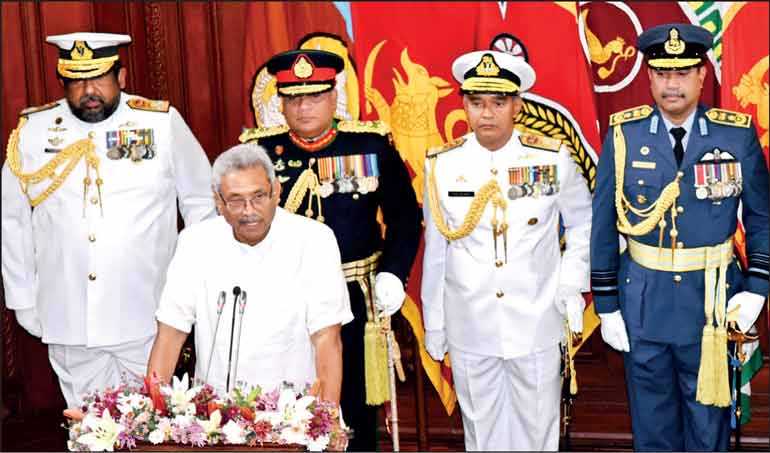Chandani Kirinde.
The 20th Amendment (20A) will restore all Executive powers of the President which were scaled down by the 19th Amendment to the Constitution, replacing the Constitutional Council with a weakened Parliamentary Council (PC), allowing dual citizens to sit in Parliament, and lifting restrictions on the number of Cabinet and junior ministers.
The President’s powers to dissolve Parliament after one year of its election, which was increased to four and half years under the 19th Amendment (19A), will be restored, while appointment of members to the Elections Commission, the Human Rights Commission, and five others will be made by the Executive.
The introduction of urgent bills to Parliament, which was done away with by 19A, will also be brought back. In such a case, a Bill which, in the view of the Cabinet of Ministers, is urgent in the national interest, can be referred directly to the Supreme Court by the President seeking a ruling on its constitutionality, with the Court required to give a ruling within 24 hours to three days. The Bill can then be tabled in Parliament, debated, and passed the same day.
All these powers were enjoyed by the Executive under the original provision of the 1978 Constitution, and were removed by 19A in a bid to reduce the powers of the President and hand over more powers to the Legislature.
Under 20A, the 14-day period between a Bill being published in the Gazette and being tabled in Parliament will be reduced to seven days.
The Constitutional Council (CC) will be replaced by the Parliamentary Council (PC), which will consist of the Prime Minister, the Speaker, the Leader of the Opposition; a nominee of the Prime Minister and a nominee of the Leader of the Opposition, the latter two being Members of Parliament. The three civil society members who were in CC have been dropped from the PC’s composition.
The Commissions that will be retained under the new constitutional amendment are: the Election Commission, the Public Services Commission, National Police Commission, Human Rights Commission of Sri Lanka, Commission to Investigate Allegations of Bribery or Corruption, the Finance Commission, and the Delimitation Commission.
The Audit Service Commission and the National Procurement Commission will be abolished.
The Chairmen and members of the seven commissions will be appointed by the President. In making such appointments, the President shall seek the observations of a Parliamentary Council.
The other appointments the President can make are to the post of Chief Justice and the Judges of the Supreme Court, the President and Judges of the Court of Appeal, Members of the Judicial Service Commission other than the Chairman, the Attorney-General, the Auditor General, the Parliamentary Commissioner for Administration (Ombudsman), and the Secretary-General of Parliament.
Under 19A, the President did not have the power to make such appointments unless they were approved by the CC, upon a recommendation made to the Council by the President.
Under 19A, a citizen of Sri Lanka who is also a citizen of any other country (dual citizen) was disqualified for election as a Member of Parliament. This was introduced under 19A, and will be removed by 20A.
The age at which a person is qualified to be elected to the Office of President, which was 30 years in the 1978 Constitution, was increased to 35 under 19 A. It will be back to 30 years under 20A.
The provisions introduced by 19A, which made it mandatory for the President to seek the advice of the Prime Minister for appointing Ministers and junior Ministers, as well as their removal, will also be done away with. The President will be able to exercise these powers on his own. He may seek consultation with the Prime Minister only where he considers such consultation to be necessary.
Under 19A, the Chief Justice and the two most senior Judges of the Supreme Court were appointed to the Judicial Service Commission by the President, subject to the approval of the Constitutional Council. Under 20A the JSC will consist of the Chief Justice and two other Judges of the SC appointed by the President.
Article 35 of the Constitution, which provided immunity to the President from suits, which was repealed under 19A and replaced with a new Article giving limited immunity to the Executive, will also be reintroduced under 20A.
